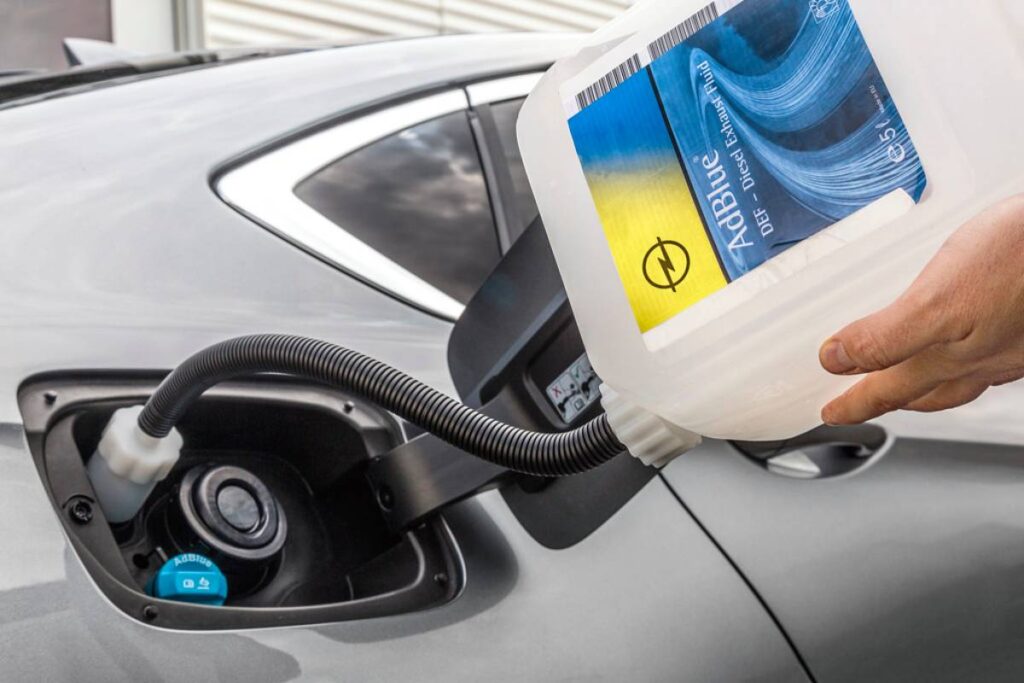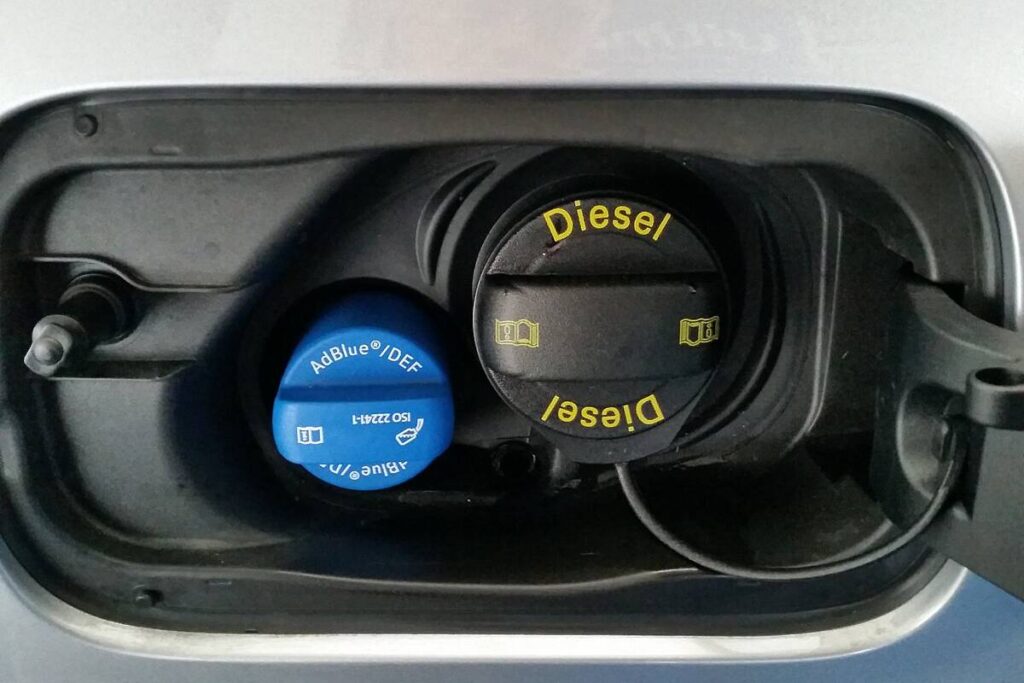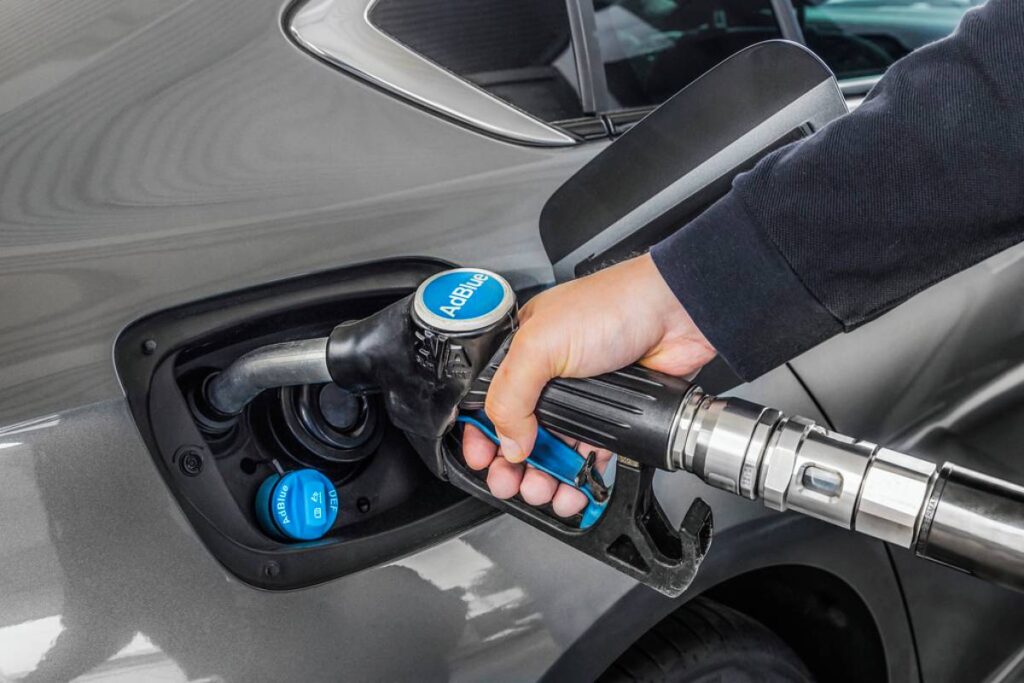Diesel engines have long been known for their power and efficiency, but they also come with a downside: harmful emissions, particularly nitrogen oxides (NOx), which contribute to air pollution and health problems.
To combat this, Selective Catalytic Reduction (SCR) systems have become increasingly common in diesel vehicles. These systems rely on a solution called AdBlue to break down NOx into harmless substances.
However, some might wonder if there are alternatives to AdBlue, such as using distilled water. In this article, we’ll explore the importance of AdBlue, the consequences of not using it, and whether distilled water can serve as a substitute.
What does AdBlue do?
AdBlue is a crucial component in reducing harmful emissions from diesel engines, particularly in vehicles like trucks, buses, and some cars. To understand what AdBlue does, let’s break it down in simple terms.
What is AdBlue?
AdBlue is a liquid solution made of purified water and urea, a compound derived from ammonia. It’s clear, non-toxic, and safe to handle.
How does AdBlue work?
AdBlue is used in a system called Selective Catalytic Reduction (SCR), which is installed in the exhaust system of diesel vehicles. Here’s how it works:
- Injection: When the engine runs, a small amount of AdBlue is injected into the exhaust system.
- Chemical Reaction: In the SCR system, the AdBlue reacts with harmful nitrogen oxides (NOx) in the exhaust gases. These NOx emissions are major contributors to air pollution and can cause smog and respiratory problems.
- Conversion: Through a chemical reaction, AdBlue breaks down the NOx into harmless nitrogen and water vapour.
- Emission: The converted nitrogen and water vapour are released as harmless elements into the atmosphere.

Why is AdBlue important?
- Environmental Impact: AdBlue plays a crucial role in reducing harmful emissions from diesel engines, helping to minimize air pollution and protect the environment.
- Regulatory Compliance: Many countries have strict regulations on vehicle emissions. AdBlue helps diesel vehicles meet these standards.
- Health Benefits: By reducing NOx emissions, AdBlue contributes to improving air quality, which in turn can benefit public health by decreasing respiratory problems and other related illnesses.
How is AdBlue used?
Using AdBlue is quite simple:
- Refilling: Vehicles equipped with SCR systems have a separate tank for AdBlue. It needs to be refilled regularly, typically during routine maintenance.
- Warning System: Most vehicles with AdBlue systems have a dashboard warning light that alerts drivers when AdBlue levels are low. It’s important to refill promptly to ensure the system continues to function properly.
- Storage: AdBlue has a shelf life, so it’s important to store it properly and use it within its recommended period to maintain its effectiveness.
What happens if you don’t use AdBlue?
If you have a diesel vehicle equipped with a Selective Catalytic Reduction (SCR) system and you don’t use AdBlue, you might run into some significant issues. Let’s dive into what happens if you neglect to use AdBlue and why it’s essential for your vehicle.
What is the SCR system?
The Selective Catalytic Reduction (SCR) system is an emissions control technology used in diesel vehicles to reduce harmful nitrogen oxide (NOx) emissions. It works by injecting a urea-based solution called AdBlue into the exhaust stream, where it reacts with NOx to convert it into harmless nitrogen and water vapour.
How does the SCR system work?
- Injection: AdBlue is injected into the exhaust stream before it reaches the catalytic converter.
- Chemical Reaction: Inside the SCR catalyst, the AdBlue undergoes a chemical reaction with the NOx emissions. This reaction breaks down the NOx into nitrogen (N2) and water vapour (H2O).
- Emission: The converted nitrogen and water vapour are released as harmless elements into the atmosphere, reducing the vehicle’s overall emissions.

Components of the SCR system
- AdBlue Tank: This is where the AdBlue solution is stored. It is usually located near the fuel tank and needs to be periodically refilled.
- SCR Catalyst: This is the component where the AdBlue and NOx react. It is typically located downstream of the diesel particulate filter (DPF) in the exhaust system.
- AdBlue Injector: This device sprays AdBlue into the exhaust stream at the right dosage to ensure efficient NOx reduction.
- Control Unit: The SCR system is controlled by an electronic control unit (ECU), which monitors various parameters such as engine load, exhaust temperature, and AdBlue consumption to optimize performance.
Benefits of the SCR system
- Emissions Reduction: The primary benefit of the SCR system is its ability to significantly reduce NOx emissions, which are harmful to both the environment and human health.
- Improved Fuel Efficiency: By reducing the workload on the engine to comply with emissions standards, the SCR system can lead to improved fuel efficiency.
- Compliance with Regulations: Many countries have strict emissions regulations, and the SCR system helps diesel vehicles meet these standards.
- Durability and Reliability: SCR systems have been proven to be durable and reliable, with minimal maintenance required beyond refilling AdBlue.
Consequences of not using AdBlue
- Increased Emissions: Without AdBlue, the SCR system cannot effectively reduce NOx emissions. This means your vehicle will emit higher levels of pollutants into the atmosphere, contributing to air pollution and potentially violating emissions regulations.
- Potential Damage to the Engine: Modern diesel engines are designed to work with SCR systems. Without AdBlue, the engine may not operate optimally, leading to increased wear and tear on engine components. Over time, this could result in costly repairs or even engine failure.
- Reduced Fuel Efficiency: When the SCR system is inactive due to a lack of AdBlue, the engine may compensate by adjusting its performance, which can lead to decreased fuel efficiency. This means you’ll spend more money on fuel over time.
- Warning Lights and Reduced Performance: Most vehicles equipped with SCR systems have warning lights to alert you when AdBlue levels are low. Ignoring these warnings can lead to reduced engine performance or even engine shutdown, leaving you stranded.
- Legal Issues: In many countries, vehicles must meet strict emissions standards. Failure to use AdBlue could result in fines or penalties for non-compliance with these regulations.
What to do if you run out of AdBlue?
If you find yourself low on AdBlue or run out entirely, here’s what you should do:
- Refill Promptly: As soon as the warning light indicates low AdBlue levels, refill the AdBlue tank. Most vehicles have a separate tank for AdBlue, and refilling is typically a simple process that can be done during routine maintenance.
- Avoid Ignoring Warnings: Ignoring warning lights and continuing to drive without AdBlue can lead to serious consequences, as mentioned earlier.
- Plan Ahead: Keep an eye on your AdBlue levels and refill before they run out completely. It’s also a good idea to keep a spare container of AdBlue in your vehicle in case of emergencies.
Can I use distilled water instead of AdBlue?
Using distilled water instead of AdBlue in a Selective Catalytic Reduction (SCR) system is not recommended and can lead to various problems. Let’s explore why using distilled water as a substitute for AdBlue is not a good idea and what consequences it may have.
What is the difference between AdBlue and distilled water?
- AdBlue: AdBlue is a urea-based solution containing purified water and urea, which is injected into the exhaust system of diesel vehicles equipped with SCR systems. It helps in reducing harmful nitrogen oxide (NOx) emissions by converting them into harmless nitrogen and water vapour.
- Distilled Water: Distilled water is water that has been purified through a process of distillation to remove impurities and minerals. While it is clean and safe for various purposes, it lacks the essential urea component found in AdBlue.

Consequences of using distilled water instead of AdBlue
- Ineffective NOx Reduction: AdBlue contains urea, which is crucial for the chemical reactions that break down NOx emissions in the SCR system. Without urea, distilled water cannot effectively reduce NOx emissions, leading to increased pollution and potential non-compliance with emissions regulations.
- Damage to SCR System: The SCR system is designed to work with AdBlue. Using distilled water instead can disrupt the system’s functionality, potentially causing damage to components such as the SCR catalyst or injector.
- Engine Performance Issues: Running a diesel engine without proper NOx reduction can affect engine performance, leading to decreased fuel efficiency, reduced power output, and potential engine damage over time.
- Legal Compliance: Many countries have strict emissions standards that diesel vehicles must meet. Using distilled water instead of AdBlue may result in non-compliance, leading to fines or penalties.
What to do instead
If you find yourself low on AdBlue or unable to refill it, here’s what you should do:
- Refill AdBlue: Refill the AdBlue tank as soon as possible. Most vehicles equipped with SCR systems have a separate tank for AdBlue, and it can be refilled during routine maintenance.
- Don’t Ignore Warnings: If the AdBlue warning light comes on, it’s crucial not to ignore it. Continuing to drive without AdBlue can lead to performance issues and potential damage to the engine.
- Plan Ahead: Keep track of your AdBlue levels and refill before they run out completely. It’s also a good idea to keep a spare container of AdBlue in your vehicle in case of emergencies.
In conclusion
AdBlue is a fluid that helps diesel vehicles with SCR systems emit fewer harmful pollutants. It’s vital to use AdBlue to avoid engine damage, reduced performance, and legal consequences. You might be tempted to use distilled water, but that’s not as effective and could cause problems.
Just make sure to keep your AdBlue tank filled up and follow the manufacturer’s, such as Ecoblue Australia and New Zealand, recommendations for maintaining your SCR system. That way, you can protect the environment, stay within emissions regulations, and keep your ride running smoothly as butter.

